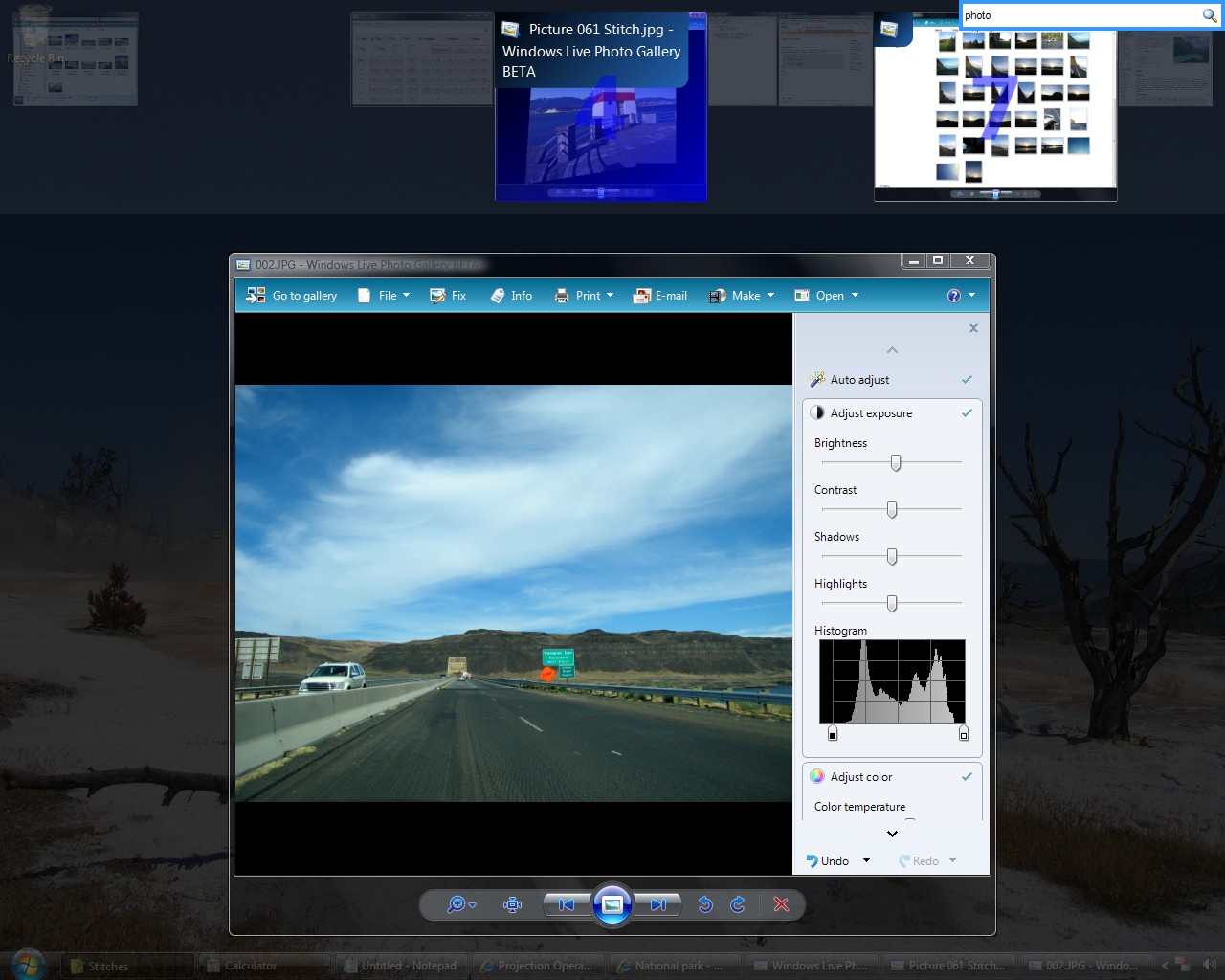SWITCHER
 |
| switcher on my desktop |
FreeZero cost.
Lots of fun.
PersonalizeWhat's your favorite color? Switcher likes it too.
MultimonEnjoy with all your monitors.
SearchQuickly find your application. Just start typing.
ShortcutsWork faster. Customize the keyboard and mouse shortcuts to fit you.
Download Switcher 2.0.0
Released 2007-10-28. Requires Windows Vista + Aero.
What's changed? | Non-installer download
AN OVERVIEW
Switcher puts you in control of your windows. See all your windows on one screen, quickly search through them, even decorate them with your favorite colors and fonts. Let's get started!
Installing and running Switcher
- Switcher requires Windows Vista and Aero. Click here to determine if you have Aero.
- Go to the Switcher home page.
- Click the Download Switcher link.
- When asked to run Run or Save, click Run.
- Follow the installation instructions.
- When you're done, run Switcher from the Start menu.
After running Switcher for the first time, it will automatically start when you log on.
Switching between windows
- Once Switcher is running, make sure you have 2 or more windows open.
- Press Windows+~ to begin switching between windows.
The ~ key is next to the Esc key. If you're using a non-US keyboard layout or find the ~ key difficult to press, see the Shortcuts section for information on changing this shortcut.
You can also configure hot corners to switch between windows. See the Shortcuts section for more information. - Use the arrow keys, Windows+~, Windows+Shift+~, or the mouse to navigate between the windows.
- Press Page Up and Page Down to switch between views. There are three available views:
- Activate a window by clicking it, pressing Enter, or pressing the number that appears on the window.
Search
Got a billion windows open? Here's how to find the window you need:
- Begin switching between windows.
- Start typing the text of the window you're trying to find. A search box will automatically appear, and the windows will move and hide themselves until only the ones matching your text appear.
For example, if the window is titled Vacation Photographs, you can type either vacation or photo to find it.
Settings
Switcher has many settings you can change to fit your needs.
- After running Switcher it'll place an icon in the taskbar:
- Double-click the icon to display Switcher settings.
Personalize
My favorite color is blue. Others like brown or orange. Instead of trying to be all those colors, Switcher lets you choose.
- Open Switcher settings.
- Click the Window Style section.
- Adjust fonts, colors, sizes, and positions however you like. A preview is displayed on the side.
- Remember to also change the appearance of selected windows using the Window state combo box at the top.
Shortcuts
You can change all the keyboard and mouse shortcuts to what works best for you.
- Open Switcher settings.
- Click the Shortcuts section.
- Here you can directly change the keyboard and mouse shortcuts that begin Switcher.
- To change other shortcuts, click Edit Shortcuts. The Switcher Shortcuts window will appear with a list of commands. Each command may be associated with several shortcuts.
- Switcher supports three types of shortcuts: keyboard shorcuts, mouse shortcuts over the screen, and mouse shortcuts over windows. These are described in further detail below.
Keyboard shortcuts
These shorcuts are activated by pressing keys on your keyboard, for example Windows+~, Ctrl+F, or even the arrow keys.
Keyboard shortcuts have the following options:
- Global shortcut: When checked, indicates that the shortcut works when Switcher is not active.
- Activate when shortcut is: Indicates when the associated command is triggered.
- Pressed: The command is triggered when the key is pressed down.
- Released: The command is triggered when the key is let go.
- End session when shortcut is released: When checked, Switcher will end the session and select the active window when the keys are let go.
Mouse over screen shortcuts
These shorcuts are activated for mouse activity on the screen.
Mouse over screen shortcuts have the following options:
- Activate when: Indicates the mouse activity that activates the shortcut.
- Button is pressed: A mouse button is pressed down.
- Button is released: A mouse button is let go.
- Mouse has moved: The mouse cursor has moved across the screen.
- Wheel has moved down: The mouse wheel has moved down.
- Wheel has moved up: The mouse wheel has moved up.
- Activate on: Restricts the shortcut to a certain monitor if you have multiple monitors.
- Global shortcut: When checked, indicates that the shortcut works when Switcher is not active.
- Screen corners and edges: Restricts the shortcut to certain corners and edges of the screen.
- Mouse buttons: The mouse buttons that activate the shortcut. If multiple buttons are selected, any of the buttons will activate the shortcut.
- Keyboard modifiers: The keyboard buttons that all must be pressed to activate the shortcut.
Mouse over window shortcuts
These shortcuts are activated when the mouse touches a window or the background during a session.
Mouse over window shortcuts have the following options:
- Activate when: Same as mouse over screen shortcuts.
- Activate when mouse is over:
- Window: The shortcut activates when the mouse is over a window.
- Background: The shortcut activates when the mouse is over the background, and not a window.
- Mouse buttons: Same as mouse over screen shortcuts.
- Keyboard modifiers: Same as mouse over screen shortcuts.
info curtsy Bao Nguyen





No comments:
Post a Comment